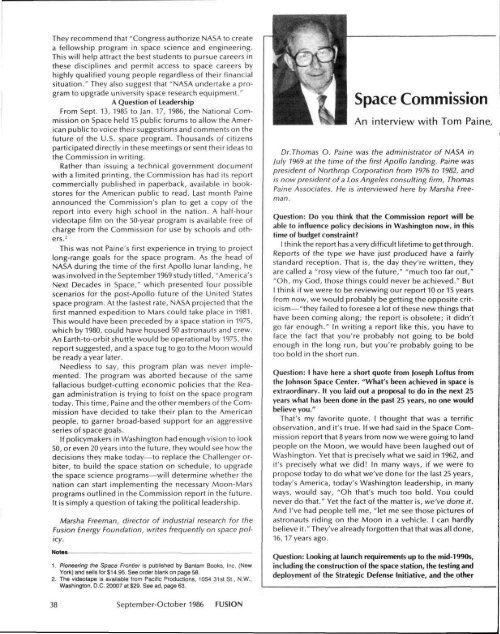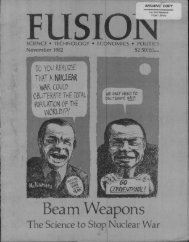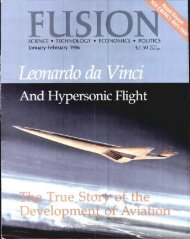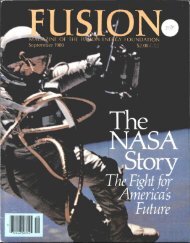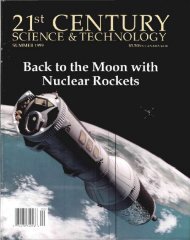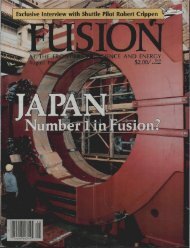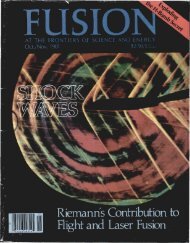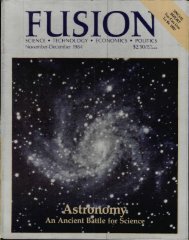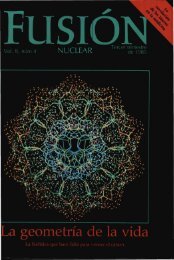Create successful ePaper yourself
Turn your PDF publications into a flip-book with our unique Google optimized e-Paper software.
<strong>The</strong>y recommend that "Congress authorize NASA to create<br />
a fellowship program in space science and engineering.<br />
This will help attract the best students to pursue careers in<br />
these disciplines and permit access to space careers by<br />
highly qualified young people regardless <strong>of</strong> their financial<br />
situation." <strong>The</strong>y also suggest that "NASA undertake a program<br />
to upgrade university space research equipment."<br />
A Question <strong>of</strong> Leadership<br />
From Sept. 13, 1985 to Jan. 17, 1986, the National Commission<br />
on Space held 15 public forums to allow the American<br />
public to voice their suggestions and comments on the<br />
future <strong>of</strong> the U.S. space program. Thousands <strong>of</strong> citizens<br />
participated directly in these meetings or sent their ideas to<br />
the Commission in writing.<br />
Rather than issuing a technical government document<br />
with a limited printing, the Commission has had its report<br />
commercially published in paperback, available in bookstores<br />
for the American public to read. Last month Paine<br />
announced the Commission's plan to get a copy <strong>of</strong> the<br />
report into every high school in the nation. A half-hour<br />
videotape film on the 50-year program is available free <strong>of</strong><br />
charge from the Commission for use by schools and others.<br />
2<br />
This was not Paine's first experience in trying to project<br />
long-range goals for the space program. As the head <strong>of</strong><br />
NASA during the time <strong>of</strong> the first Apollo lunar landing, he<br />
was involved in the September 1969 study titled, "America's<br />
Next Decades in Space," which presented four possible<br />
scenarios for the post-Apollo future <strong>of</strong> the United States<br />
space program. At the fastest rate, NASA projected that the<br />
first manned expedition to Mars could take place in 1981.<br />
This would have been preceded by a space station in 1975,<br />
which by 1980, could have housed 50 astronauts and crew.<br />
An Earth-to-orbit shuttle would be operational by 1975, the<br />
report suggested, and a space tug to go to the Moon would<br />
be ready a year later.<br />
Needless to say, this program plan was never implemented.<br />
<strong>The</strong> program was aborted because <strong>of</strong> the same<br />
fallacious budget-cutting economic policies that the Reagan<br />
administration is trying to foist on the space program<br />
today. This time, Paine and the other members <strong>of</strong> the Commission<br />
have decided to take their plan to the American<br />
people, to garner broad-based support for an aggressive<br />
series <strong>of</strong> space goals.<br />
If policymakers in Washington had enough vision to look<br />
50, or even 20 years into the future, they would see how the<br />
decisions they make today—to replace the Challenger orbiter,<br />
to build the space station on schedule, to upgrade<br />
the space science programs—will determine whether the<br />
nation can start implementing the necessary Moon-Mars<br />
programs outlined in the Commission report in the future.<br />
It is simply a question <strong>of</strong> taking the political leadership.<br />
Marsha Freeman, director <strong>of</strong> industrial research for the<br />
Fusion Energy Foundation, writes frequently on space policy.<br />
Notes<br />
1. Pioneering the Space Frontier is published by Bantam Books, Inc. (New<br />
York) and sells for $14.95. See order blank on page 58.<br />
2. <strong>The</strong> videotape is available from Pacific Productions, 1054 31st St., N.W.,<br />
Washington, D.C. 20007 at $29. See ad, page 63.<br />
38 September-October 1986 FUSION<br />
Space Commission<br />
An interview with Tom Paine,<br />
Dr.Thomas O. Paine was the administrator <strong>of</strong> NASA in<br />
July 1969 at the time <strong>of</strong> the first Apollo landing. Paine was<br />
president <strong>of</strong> Northrop Corporation from 1976 to 1982, and<br />
is now president <strong>of</strong> a Los Angeles consulting firm, Thomas<br />
Paine Associates. He is interviewed here by Marsha Free-<br />
Question: Do you think that the Commission report will be<br />
able to influence policy decisions in Washington now, in this<br />
time <strong>of</strong> budget constraint?<br />
I think the report has a very difficult lifetime to get through.<br />
Reports <strong>of</strong> the type we have just produced have a fairly<br />
standard reception. That is, the day they're written, they<br />
are called a "rosy view <strong>of</strong> the future," "much too far out,"<br />
"Oh, my Cod, those things could never be achieved." But<br />
I think if we were to be reviewing our report 10 or 15 years<br />
from now, we would probably be getting the opposite criticism—"they<br />
failed to foresee a lot <strong>of</strong> these new things that<br />
have been coming along; the report is obsolete; it didn't<br />
go far enough." In writing a report like this, you have to<br />
face the fact that you're probably not going to be bold<br />
enough in the long run, but you're probably going to be<br />
too bold in the short run.<br />
Question: I have here a short quote from Joseph L<strong>of</strong>t us from<br />
the Johnson Space Center. "What's been achieved in space is<br />
extraordinary. It you laid out a proposal to do in the next 25<br />
years what has been done in the past 25 years, no one would<br />
believe you."<br />
That's my favorite quote. I thought that was a terrific<br />
observation, and it's true. If we had said in the Space Commission<br />
report that 8 years from now we were going to land<br />
people on the Moon, we would have been laughed out <strong>of</strong><br />
Washington. Yet that is precisely what we said in 1962, and<br />
it's precisely what we did! In many ways, if we were to<br />
propose today to do what we've done for the last 25 years,<br />
today's America, today's Washington leadership, in many<br />
ways, would say, "Oh that's much too bold. You could<br />
never do that." Yet the fact <strong>of</strong> the matter is, we've done it.<br />
And I've had people tell me, "let me see those pictures <strong>of</strong><br />
astronauts riding on the Moon in a vehicle. I can hardly<br />
believe it." <strong>The</strong>y've already forgotten that that was all done,<br />
16,17 years ago.<br />
Question: Looking at launch requirements up to the mid-1990s,<br />
including the construction <strong>of</strong> the space station, the testing and<br />
deployment <strong>of</strong> the Strategic Defense Initiative, and the other


